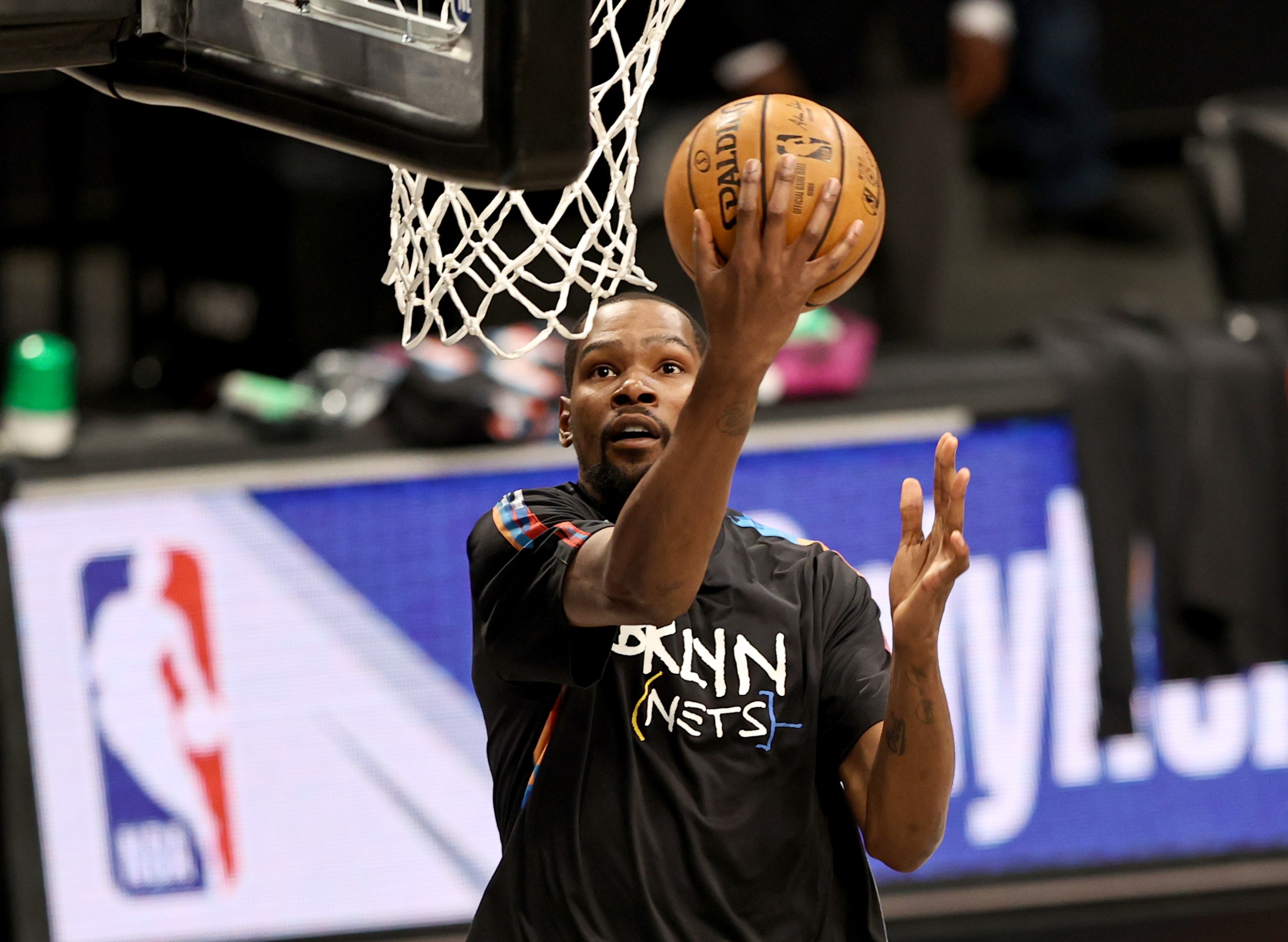Kevin Durant played NBA basketball last night for the first time since Feb. 13, and wouldn't you know it, he's still Kevin Durant. The most rarely seen member of the Nets' Big Three eased back into things with 19 minutes of action in a blowout win over the Pelicans, and in those scant minutes he scored 17 points on 5-of-5 shooting to go along with seven rebounds and five assists. That's about as well as a person can play basketball in under 20 minutes of run, which makes sense since Durant is extremely good at basketball.
KD DOESN'T MISS in his return.
— NBA (@NBA) April 8, 2021
🔥 5-5 FGM
🔥 2-2 3PM
🔥 5-5 FTM@KDTrey5 x @BrooklynNets pic.twitter.com/XtDU9zcxQl
The only thing that felt a little strange about Durant's return to the floor was the fact that he came off the bench. After initially being announced as one of the game's starters, Durant was kept on ice for the entire first quarter and a large chunk of the second. He didn't make his first appearance until there were about seven minutes left to play in the first half, and stayed on the court until the start of the fourth quarter, when all the non-scrubs got to end their nights early thanks to the size of the lead.
After the victory, Durant was asked about the decision to start the game with him on the bench, which he explained was an idea head coach Steve Nash came up with to make it possible for Durant to play in the fourth quarter if the game was close without exceeding his minutes cap. "It was one of those exercises that we thought about yesterday and see how it worked," Durant said.
Nash choosing to bring one of his best players off the bench during his first game back from a lengthy injury absence is a small thing on its own, but it's indicative of the broader basketball philosophies that have made Brooklyn's season such a success so far. They've been through a lot of exercises, or maybe "experiments" is the more accurate term, during their first season of the Durant-Irving-Harden era—with all three missing significant time at one point or other—and somehow nothing has really blown up in their faces yet.
Maybe it seems dumb to express any sort of surprise at a team with three of the best basketball players in the known universe sitting atop the conference standings, but we've learned several times before that newly assembled super teams can create all sorts of novel problems. The Nets looked like a super team particularly set up to go through some serious growing pains. Here was a squad that was not only asking a first-year head coach to work with two larger-than-life free-agent signings, but also a third ball-dominant superstar who was brought in after the start of the season at the expense of the team's depth and roster continuity. There was no shortage of hand-wringing questions to be asked by the people who are into that sort of thing: How would the stars fit in and play with each other? What would happen if one or more of them got hurt for an extended period of time? Would Nash be able to get anything out of the rest of the scrubs that had been assembled around the Big Three? And oh yeah, here are Blake Griffin and LaMarcus Aldridge fresh off the buyout market. What's to be done with them?
None of those questions have yet to really matter at all, and that's a testament to how much the Nets have been willing to experiment and trust their players to make things work. This is a team that has been able to fluidly switch between various offensive and defensive schemes depending on who is on the floor, that has made it possible for two ball-dominant guards in Irving and Harden to thrive together, and made "Fuck it, why not?" ideas like turning 6-foot-4 Bruce Brown into a screen-and-dive center part of their blueprint for success. When watching the Nets play one doesn't get the impression that this is a team finding success through constant drilling of complex systems and enforcement of rigid hierarchies, but by simply rolling the ball onto the court and seeing what happens.
There's something charming about that. It's easy to get grumpy about how this team was created—Durant and Irving choosing an invasive franchise with no real fanbase just because it had the right combination of coastal living and salary cap space; Harden forcing his way onto the team at the expense of a collection of fun, young players—but it's more fulfilling to allow yourself to be heartened by both the manner of the team's assemblage and its finished product. There's no mastermind GM, cutting-edge ownership group, or hard-ass veteran coach obnoxiously demanding anyone's attention or credit here. It's just a group of players who made the team they wanted, playing the game the way they want to, and doing it very well.






